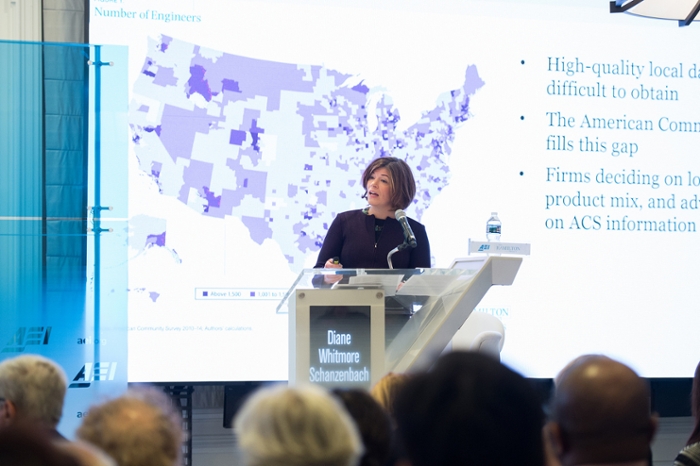The Vital Role of Government Statistics
Hamilton/AEI report calls for continued investment in federal data collection
Get all our news

A report from the American Enterprise Institute and The Hamilton Project supports investing in federal data.
According to a recent bipartisan report between the American Enterprise Institute and The Hamilton Project at the Brookings Institution, government data are critical not only to policy, but to businesses and families—even your local weather anchor—and should not be a partisan issue.
IPR economist Diane Whitmore Schanzenbach, who directs The Hamilton Project and coauthored the report, presented highlights from the report at “The Vital Role of Government Statistics: Strengthening Research, Governance, and Innovation” on March 2 at the American Enterprise Institute in Washington, D.C. A panel of experts, including former IPR fellow Rebecca Blank, now chancellor of the University of Wisconsin–Madison, and Martin Feldstein, Harvard professor and president emeritus of the National Bureau of Economic Research, discussed the report and the vital role of government statistics.
Schanzenbach cited James Madison, who said that accurate agricultural, commercial, and manufacturing information would be useful to Congressional debaters “that they might rest their arguments on facts, instead of assertions and conjectures.” Though some might date the start of large-scale government data collection to the era of modern computing in the 1950s, the collection of American data for the common good is enshrined in the U.S. Constitution: The Founding Fathers created the constitutional requirement for a national decennial census to apportion U.S. representatives and taxes among the states.
The joint Hamilton/AEI report provides examples of federal data at work: Information from the Bureau of Labor Statistics has enabled researchers to learn more about the impact of pro-work policy reforms in the 1990s, including the expansion of the Earned Income Tax Credit, and other data have shed light on the causes of recent increases in obesity and middle-age mortality rates. This deeper knowledge makes them better prepared to advise policymakers on future reforms.
But it is not just policymakers who benefit from government data. Schanzenbach and her coauthors explained that big retailers rely on information from the U.S. Census Bureau’s American Community Survey to help choose store and distribution center locations, while families are aided in their college application decisions by federal data about tuition and student loans from the U.S. Department of Education.
“Even the weather forecasts that help families plan their weekend outings are based on government-collected data,” the report stated.
Federal statistics also drive national and state expenditures, explained Blank, as part of the panel moderated by New York Times editor David Leonhardt.
“For instance, the unemployment rate is a trigger for unemployment insurance. The [Consumer Price Index] is what determines whether your mom or your grandma’s Social Security check will go up this month, and by how much,” Blank said. “There are literally tens, if not hundreds, of billions of dollars that are driven by this data.”
Schanzenbach noted that less than 0.18 percent of the federal budget—a mere one-fifth of 1 percent—is spent on collecting and maintaining the data, and called the vast work done by federal agencies with this money “extraordinary.”
Nonetheless, room for improvements still exists. The report noted federal statistics need to cover more topics relevant to today’s economy, and that linking survey and administrative data could improve data quality in a cost-effective manner. Synchronizing data across federal agencies is also important, the report noted. Making these improvements, though, will require more investment.
“Americans across the political and philosophical spectrum should recognize the importance of protecting the intellectual integrity of the data collected by the federal government,” Schanzenbach concluded.
Diane Whitmore Schanzenbach is professor of human development and social policy, an IPR fellow, and director of The Hamilton Project.
Published: May 31, 2017.